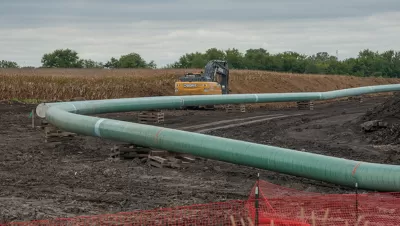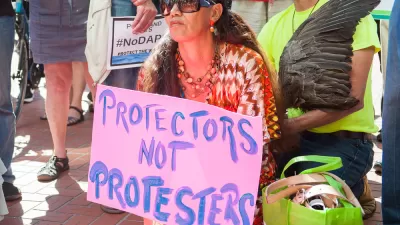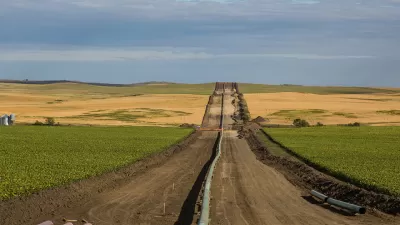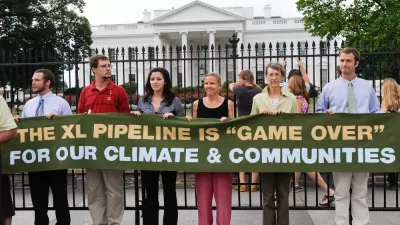Adding insult to injury in a bad week for environmental causes, the Dakota Access pipeline began shipping oil this week.

Blake Nicholson Reports: "The $3.8 billion Dakota Access pipeline began shipping oil for customers on Thursday, as Native American tribes that opposed the project vowed to continue fighting."
"Dallas-based Energy Transfer Partners announced that the 1,200-mile line carrying North Dakota oil through South Dakota and Iowa to a distribution point in Illinois had begun commercial service," explains Nicholson. Together, the Dakota Access pipeline and the Energy Transfer Crude Oil Pipeline from Illinois will deliver some 520,000 barrels of oil to the Gulf Coast every day.
Meanwhile, four Sioux tribes are still fighting the pipeline in federal court, "hoping to persuade a judge to shut down the line." In December, it seemed water defenders had won a decisive victory. Then President Trump reversed the Obama Administration's decision on the pipeline and the U.S. Army Corps of Engineers soon followed suit.
FULL STORY: $3.8 billion Dakota Access oil pipeline begins service

Planetizen Federal Action Tracker
A weekly monitor of how Trump’s orders and actions are impacting planners and planning in America.

Chicago’s Ghost Rails
Just beneath the surface of the modern city lie the remnants of its expansive early 20th-century streetcar system.

San Antonio and Austin are Fusing Into one Massive Megaregion
The region spanning the two central Texas cities is growing fast, posing challenges for local infrastructure and water supplies.

Since Zion's Shuttles Went Electric “The Smog is Gone”
Visitors to Zion National Park can enjoy the canyon via the nation’s first fully electric park shuttle system.

Trump Distributing DOT Safety Funds at 1/10 Rate of Biden
Funds for Safe Streets and other transportation safety and equity programs are being held up by administrative reviews and conflicts with the Trump administration’s priorities.

German Cities Subsidize Taxis for Women Amid Wave of Violence
Free or low-cost taxi rides can help women navigate cities more safely, but critics say the programs don't address the root causes of violence against women.
Urban Design for Planners 1: Software Tools
This six-course series explores essential urban design concepts using open source software and equips planners with the tools they need to participate fully in the urban design process.
Planning for Universal Design
Learn the tools for implementing Universal Design in planning regulations.
planning NEXT
Appalachian Highlands Housing Partners
Mpact (founded as Rail~Volution)
City of Camden Redevelopment Agency
City of Astoria
City of Portland
City of Laramie





























